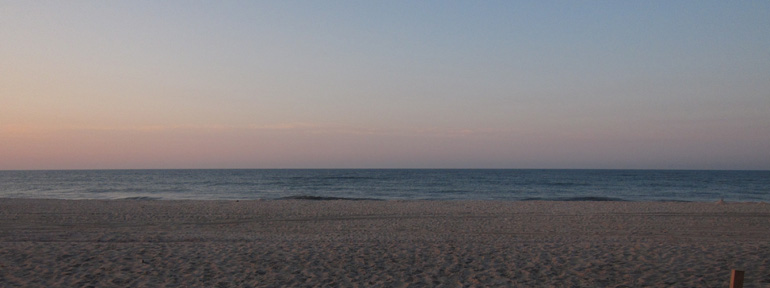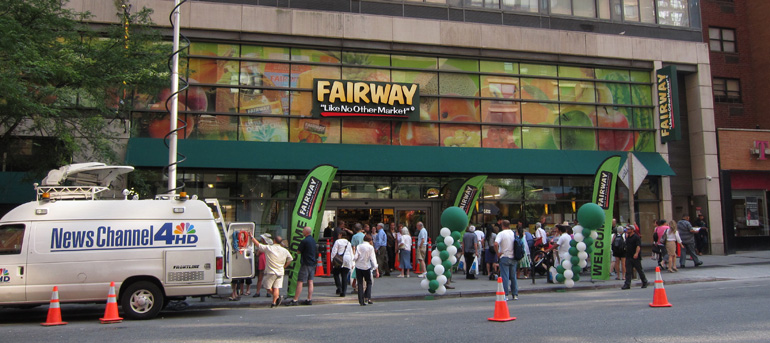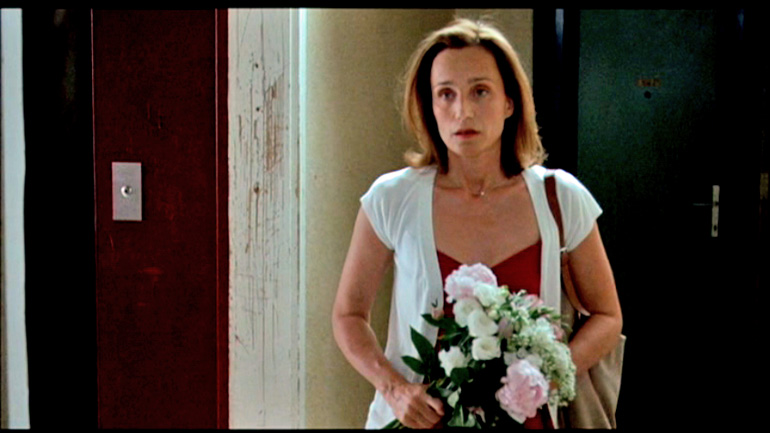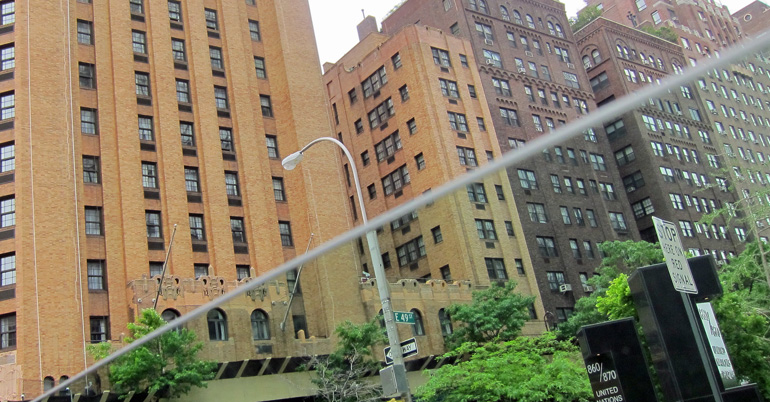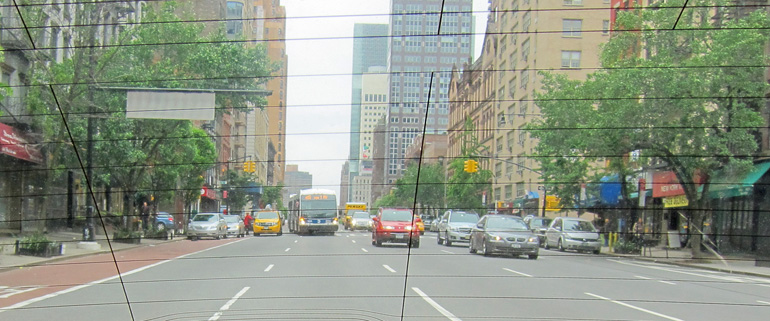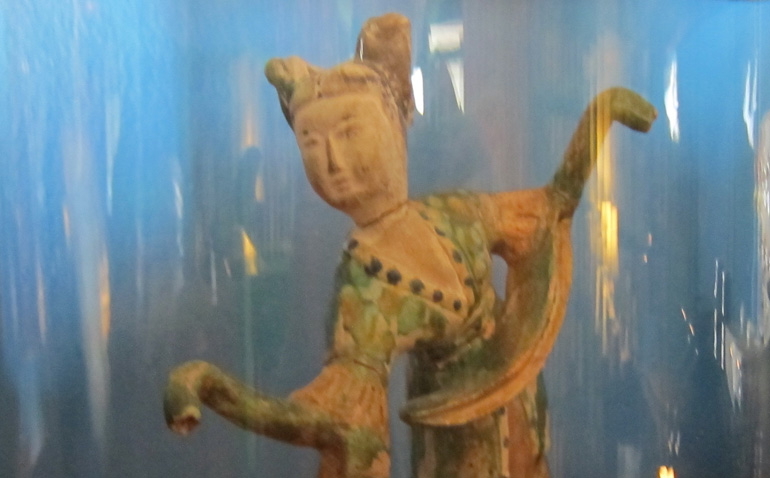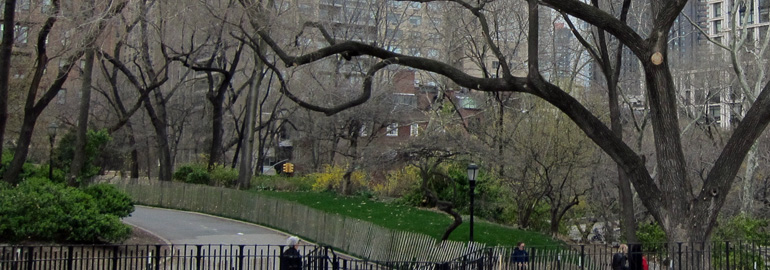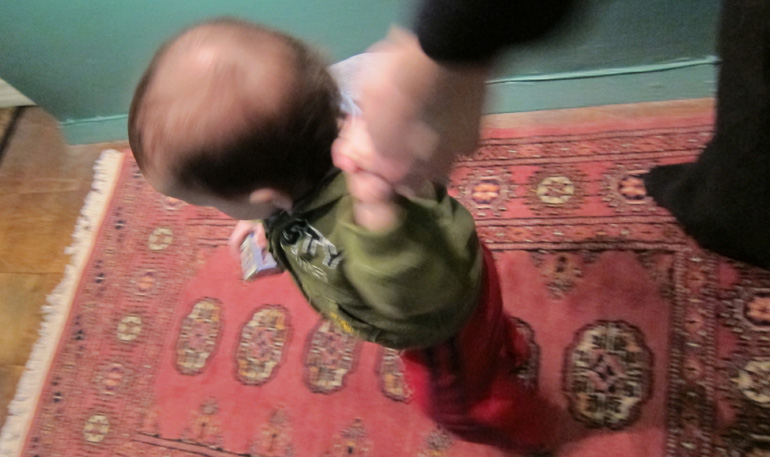
My friend Eric’s account of his holiday trip to Paris reminded me not as much of my own three visits as of my fear that I would never get to Europe — a fear that overshadowed the first half of my life, or nearly. I was 29 when I finally got to go — late in the day for someone who had committed the English succession to memory in grade school. I was to go to Angers in my sophomore year at Notre Dame, but my life fell apart for a while before that could happen, and my sophomore year turned into a second freshman year spent very much in South Bend. And once I’d graduated, I was more concerned about getting back to New York than with making it to Europe. My scheme for getting back to New York via law school ultimately worked, more or less, but it turned out that I crossed the Atlantic first. My mother died, and my father took me to Europe in her place.
In an impish comment at Sore Afraid, I suggested that the trip was booked before cancer treatments killed my mother (this was in 1977). Of course that’s not true. All we were thinking about for most of 1976 was whether the doctors would turn out to be right about how many months she had to live. They were. Oh, and one other thing: how to relate to a woman who let it be known from the first inklings of illness that her demise was not to be discussed. Her last words to me, which I could barely make out (to her towering frustration), were: “Did you put the leftover ravioli in the freezer?” We’re talking big-time denial here. Mother was dead within the hour, as we were driving home from M D Anderson.
Soon after that, my father developed throat cancer. At least, his doctor was worried that that might be what had turned his throat a chalky white. By now, the trip to Europe was booked. It would be a road trip, just like the trips that my parents loved to take wherever they were, even if it meant hiring a driver. I truly believe that my father’s favorite thing in life was to zoom along an Interstate Highway at 110 0r 120 mph, preferablyin Kansas, bombing from El Dorado — a town that exercised a mysterious attraction for him, perhaps because there was a super deluxe motel there — to Kansas City. I think that he liked it best when my mother was doing the speeding. They really loved their cars, which may explain why I’m just as happy not to own one.
We would fly to London and then to Paris, my father and I. From Paris we would drive straight east, through Munich and Salzburg, to Vienna. Then would fly to Ireland, spend a few days at Dromoland Castle, and come home. I can’t say that I was looking forward to all that driving, but in retrospect I think that it would have been the best part of the trip — which was not canceled because of Dad’s throat cancer. Dad didn’t have throat cancer. The white stuff on his esophagus had been deposited there by aspirin tablets, which my father had fallen into the habit of swallowing without drinking water. We did go to Europe after all. But once we were there, Dad’s life fell apart. He discovered that I was not the fun traveling companion that my mother had been, and his mourning commenced in earnest.
It started on the flight over. I was cross because we were seated in coach. For seven years, I had not flown on a commercial airliner, much less in coach. I piggy-backed rides (rarely offered) on company planes. I got used to driving up right up to the jet, and even more used to climbing the stairs without a thought for the luggage, which was stowed by the crew. It turned out that I have a natural and abiding affinity for first-class travel. If I have to settle for less, I’d just as soon settle for staying home. I know that now. I was only beginning to learn it as I sat next to Dad in the vastness of Pan Am’s steerage. I tried to distract myself with a book. For the life of me, I can’t remember Dad’s exact words, but it amounted to a request for conversation that, ungrateful wretch that I was, I couldn’t think how to grant. I was too busy worrying that one of the large families occupying the center bay of seats would produce a farm animal.
Also, after all those years of neat little Havillands, I couldn’t see how a 747 could stay airborne. My fear of flying blossomed two flights later, crossing the Alps in a Caravelle. For the duration of the flight, my body fairly screamed its conviction that the plane was locked in a whistling descent, hurtling toward the Matterhorn. Conversation was once again out of the question.
We were on the Caravelle, and not in a sedan, because — d’you know, I forget why? Every morning, in London and then in Paris, Dad announced that we’d be going home the next day. I think that he substituted the flight to Vienna just to do something. A premature return to Houston would have entailed embarrassing explanations. And even Dad knew that I wasn’t entirely to blame for not being Mom. Nor was I to blame for the doctor’s visits, at the Grosvenor House and the Intercontinental in Paris. Both of them declared that he must stop drinking if he wanted to stop falling down. So we flew to Vienna for the few days that we’d meant to spend there, and found that our hotel room was wallpapered identically to the dining room in our Bronxville house, which my parents had (treacherously, as far as I was concerned) abandoned for Tanglewood in 1968. Maybe the wallpaper made the mourning easier. Maybe it was the fact that I had no real agenda in Vienna. My father sat through a pops concert with me — that’s all that was on offer, what with all the real musicians off at various summer festivals, and I remember thinking that I’d be the only person in nearby St Stephen’s if I got to an organ concert ten minutes earlier. I had to stand at the back of the nave, a nice little lesson in Viennese musicality. By the time we flew to Dublin, I was almost out of the doghouse. But only almost. Dad blew his top when all the books and records that I’d bought in the three capitals added sixty dollars in surcharges.
In Dublin, we spent the night at the Gresham. I did not sleep; the sound of pub-crawlers never let up. But I must have dozed, because in the morning I was awake enough to get behind the wrong-sided wheel of a car for the first time in my life and drive right across Ireland. And now that we were in a car, my father and I really had fun. I don’t know what we talked about, but there was laughter, and I basked in his admiration of my driving skill, which was largely exhibited in a series of near misses with death. What fun that drive across Bavaria would have been! Plus, it would have kept us on schedule. Now we were arriving at Dromoland castle — a first class hotel if ever there was one — a few days early, and they weren’t ready for us. We had to stay in a motel on the property, a decidely non-super deluxe motel. That was all right; we spent the days driving all over Counties Clare and Galway. Aside from the Cliffs of Moher, the ruins of an abbey, and an unspeakably flavorless tapioca pudding, I have no recollection of seeing anything. It was wasn’t important. Driving was important. We drove around, as aimlessly as teenagers, and had a blast.
Dad did not fall down in Ireland. He almost fell, but he caught himself before he tripped over me. I had given up on the bed and was trying to sleep on the floor — surprise!
After doing some research, Dad discovered that Aer Lingus wouldn’t impose TWA’s luggage surcharges, so it was in an Irish brogue that I learned, midway across the Atlantic, that we’d be landing at JFK in the middle of a blackout. How would that work?


